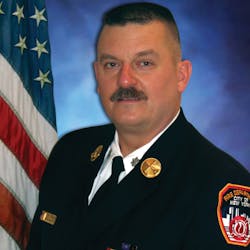I’ve worked in several fire departments over the years, and the staffing and number of officers who were on duty varies from place to place. In the FDNY, where I worked for more than 33 years, an officer worked in every company on every shift, whether there was a single unit or two companies or even three separate companies in a single firehouse.
The reason that I mention this is that there always are officers around in the firehouse, and firefighters get to know and observe both the officer who they work with and, of course, the officers of the other unit, too. So, what does this have to do with the “toughest boss” that’s mentioned in the title?
How officers work
Let’s say you that you work in Engine 2, and Ladder 2 is the second unit in the firehouse. Each shift that you work, you might work with Lt. Connelly, but Capt. Smithwick also usually is on duty with the truck on the same shifts. So, you work with both of these officers, even though your direct supervisor is your engine officer, Connelly.
The same situation exists in every department. Even in a single company, firefighters start to hear about and see how the officers who are on the other shifts work and manage their firefighters. Even in volunteer departments, firefighters learn quickly how each officer works.
So, how do they work?
Well, some officers are rather laid back and don’t get too excited about anything. Some officers are really into the job and love to train. Some officers are a little more strict than are most of the others, and some are just pushovers.
Then, there’s the toughest boss in the house. I worked with several of these people, and I must say, it wasn’t always fun. In fact, sometimes, it was quite stressful. I know it is 2022, and many people talk about exactly how officers should behave and operate and that nobody ever should be uncomfortable at work.
Sorry, I disagree.
I recently went to a wake for a retired FDNY lieutenant who worked in the same firehouse where I served as a firefighter. His sons are on the job now, and when I went up to greet them, I told them and the other family members that when I worked with their dad, I was scared of him. Really scared! They all laughed and said that about 75 other guys told them the exact same thing. I laughed, too, but I didn’t laugh back then when I was in the firehouse with him.
All business
The officer, this boss, was a tough guy to work for. He was all business all of the time. When a run came in, you got to the rig quickly and got dressed twice as quickly. At every job, you carried the correct tools and got to your correct assignment. Around the firehouse, there was no unnecessary nonsense (you know what I mean) going on, and everything was expected, and everything did run smoothly.
How did this happen and why? This officer was serious about what everyone was there to do. It was work. It was the firehouse. Some officers don’t know the difference between being at work and being at a barbecue. Others, such as this officer, were like night and day in the firehouse and off duty at home. Some officers are more concerned with being popular and well-liked and included in the firehouse banter and laughter, and others are more concerned with the condition of the tools and equipment and the conduct and productivity of their firefighters.
Now, I am not saying that any of these behaviors are the only correct way to operate as an officer or that any are completely wrong and will result in disaster. I am saying that every tough boss who I ever worked for or with had their ducks lined up. Their rigs were clean, the tools were immaculate, their firefighters knew their job, and they and their company had a great reputation.
So, if you are a tough boss, good for you and for your firefighters and for the folks who might have to call you in an emergency. I love tough bosses!
About the Author
John J. Salka Jr.
Battalion Chief
JOHN J. SALKA JR., who is a Firehouse contributing editor, retired as a battalion chief with FDNY, serving as commander of the 18th battalion in the Bronx. Salka has instructed at several FDNY training programs, including the department’s Probationary Firefighters School, Captains Management Program and Battalion Chiefs Command Course. He conducts training programs at national and local conferences and has been recognized for his firefighter survival course, “Get Out Alive.” Salka co-authored the FDNY Engine Company Operations manual and wrote the book "First In, Last Out–Leadership Lessons From the New York Fire Department." He also operates Fire Command Training, which is a New York-based fire service training and consulting firm.

